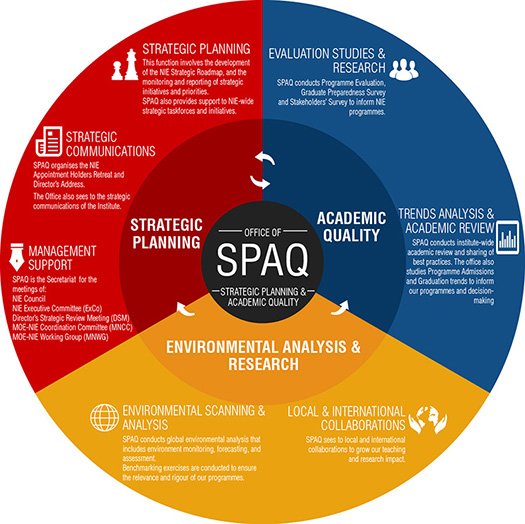THEME 5: LEARNING SYSTEM AND LEARNING PROFESSION
Review and Enhancement of Initial Teacher Preparation Programs: Maintaining Quality
The systemic approach to the preparation of teachers is undergirded by evaluation procedures and processes intentionally designed to be both educative and developmental. Characteristically, NIE engages in ongoing self-study: continuous learning, reflection, and evaluation for the purpose of renewal of its teacher preparation curriculum. A major overhaul took place in 2001 with the specific aim of integrating content and pedagogical preparation. This was reflected structurally with the joint location of content and pedagogy specialists in the same NIE academic groups or departments, which helped strengthen these ties. Since 2001, the institution has substantially revised the preservice preparation curriculum twice. In 2004, the institution undertook a comprehensive review of its ITP programs “to re-focus teacher preparation as teacher ‘education’ rather than teacher ‘training’. . .[and] articulat[e] the desired attributes of a beginning teacher” (Chong & Cheah, 2009, p. 2).
In order to ensure abundance, diversity, and depth in terms of expertise, data, models, practices, and ideas, NIE’s self-study method was typically multilayered, employing an “Expert consensus-building approach. . .[a] Research-based approach. . .[a] Professional Consensus approach” (Chong & Cheah, 2009, p. 2). The institution consulted with local and international experts on teacher education, as well as with key stakeholders such as principals and teachers. From this extensive examination came the Values, Skills, and Knowledge (VSK) framework for ITP, followed in 2008 by another effort to “reflect, review, refresh, and recharge. . .[so as]. . . to enhance the structure and substance of our TE (teacher education) model including program design and delivery, curriculum and pedagogical innovations, and preserve, build, and continually develop a culture of great respect for learning” (NIE, 2009, pp. 9–10).
NIE’s 2008 review was guided by MOE’s articulation of 21st-century competencies (21CC) presented earlier. Key characteristics of outstanding teacher education programs were also studied in the review process:
seamless integration of courses that constructs a consistent learning environment throughout the program; comprehensible standards of practices and performance; a core curriculum with emphasis on student learning, assessment, and content pedagogy; use of problem-based teaching methods; active assessment using case studies and portfolios, drawing on the best practices of skilled veteran teachers in clinical experiences; and extending the amount of clinical exposure in the program.
(Darling-Hammond, as cited in NIE, 2009, p. 7)
NIE took on board these research findings to enhance its TE model in order to prepare teachers who are able to meet the challenges of preparing their students for the realities of the 21st-century global workplace and society, resulting in the articulation of TE21, Teacher Education for the 21st Century.
Researching into Practice for Practice
Learning as a profession does not stop at just the level of developing teachers as professionals and allowing their careers to grow along differentiated career tracks. More importantly, the system is keen to research into practice in order to find out what works, what does not, and what needs tweaking and refinement.
A systematic research program in the area of teacher learning, spanning from ITP through to the formative years as the BTs become professional teachers, is also critical. To this end, a number of competitively funded research projects on evidence-based initial teacher education and evaluation of the impact of key TE21 initiatives have provided the basis for future directions. Apart from these studies, the Office of Strategic Planning and Academic Quality (SPAQ) based at NIE was established in March 2014 after a reorganization, to incorporate the two key functions of strategic planning and academic quality management into a single office. SPAQ has expanded its role to include strategic planning to tap the synergies and linkages between strategic planning and evidence-informed academic quality enhancement efforts. For example, SPAQ administers various surveys, including the Stakeholder Survey, the Program Evaluation Survey, and the Graduate Preparedness Survey, to assess the quality of teaching and learning at strategic points of the teacher development process, and to track the impact of the implementation efforts in NIE’s teacher preparation programs. Apart from ensuring academic quality, SPAQ also conducts environmental scans in order to be able to design the institute’s overall strategic goals and directions. SPAQ takes the lead in formulating NIE’s long-term strategic plans; its role is presented in Figure 13.

Figure 13. Strategic Planning and Academic Quality Functions at NIE.
Source: NIE, n.d.d
At the national level, the curriculum policy office of MOE develops and reviews policies to ensure that schools adopt sound, balanced, purposeful, and effective curriculum, pedagogy, and assessment practices, which are aligned with national directions and aspirations. It also engages in research work to ensure that curriculum, pedagogy, and assessment policies are informed by sound educational thinking as well as prevailing trends and developments in both industry and the wider society which hold implications for education. It facilitates sound, balanced, purposeful, and effective curriculum; and pedagogy and assessment practices in schools through partnerships with relevant divisions, branches, and organizations NIE and the SEAB (MOE, n.d.c.).